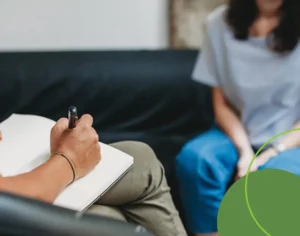Living with Relationship Obsessive-Compulsive Disorder (ROCD) can feel like navigating a maze without a map. The intrusive thoughts, the constant doubts, the compulsive actions – it can be overwhelming, can’t it? However, you are not alone, and more importantly, there’s help. Therapy, specifically designed to tackle ROCD, can become your guiding light through this maze. This article will delve into the intricacies of ROCD therapy, its approach, and how it can empower you to regain control, overcome challenges, and lead a happier, healthier life. So let’s dive in and explore!
Contents
What is ROCD Therapy?
 Let’s imagine, you’re sitting on the couch next to your partner. A thought suddenly flashes through your mind – “Do I really love them?” or “Are they truly right for me?” Now, everyone experiences doubts like these at some point in their relationships. However, if you find yourself haunted by these thoughts, if they’re causing you significant distress, or if you find yourself acting out compulsive behaviors to quell these doubts, you might be dealing with Relationship Obsessive-Compulsive Disorder or ROCD.
Let’s imagine, you’re sitting on the couch next to your partner. A thought suddenly flashes through your mind – “Do I really love them?” or “Are they truly right for me?” Now, everyone experiences doubts like these at some point in their relationships. However, if you find yourself haunted by these thoughts, if they’re causing you significant distress, or if you find yourself acting out compulsive behaviors to quell these doubts, you might be dealing with Relationship Obsessive-Compulsive Disorder or ROCD.
But what can you do about it?
Well, ROCD therapy is a specialized form of treatment designed to help individuals like you, who are grappling with excessive doubts, fears, and compulsions related to their relationships.
This therapy aims to help you manage and ultimately overcome the vicious cycle of obsessive thoughts and compulsive actions. It aids in changing your patterns of negative thinking, exposing you gradually to your fears to reduce their impact, and teaching you to stay present and accept your thoughts without judgment.
The purpose? To free you from the distressing grip of ROCD and enable you to enjoy your relationships fully. So, if you find yourself agonizing over your relationship-related fears, know that ROCD therapy is here to help you navigate these stormy seas towards calmer waters.
What Are Some Signs That You Are Facing ROCD?
 Identifying the signs of ROCD is crucial for seeking appropriate help. Here are some symptoms that may indicate you’re dealing with ROCD:
Identifying the signs of ROCD is crucial for seeking appropriate help. Here are some symptoms that may indicate you’re dealing with ROCD:
- Constant Doubts: You’re continually questioning your feelings for your partner, even in the absence of any major issues in your relationship.
- Compulsive Checking: You find yourself repeatedly checking your emotions or comparing your relationship to others to ensure it’s ‘right’.
- Obsession Over Partner’s Flaws: You obsess over your partner’s minor imperfections or flaws, which seem magnified in your mind.
- Excessive Reassurance Seeking: You frequently ask your partner or others for reassurance about your relationship.
- Avoidance of Intimacy: You avoid being emotionally or physically intimate with your partner due to fear of confirming your doubts.
- Fear of Commitment: You have a persistent fear of making the ‘wrong’ choice, leading to avoidance of commitment.
- Distress and Anxiety: Your doubts and compulsions cause significant distress, anxiety, or depression, interfering with your daily life.
Remember, these signs do not confirm ROCD, but they do suggest that you might need to reach out to a mental health professional for a thorough assessment. Help is available, and recovery is possible.
Can It Affect Your Relationship?
 ROCD can have a profound impact on your relationship. Here are a few ways it can manifest:
ROCD can have a profound impact on your relationship. Here are a few ways it can manifest:
- Perpetual Doubt: You may constantly question your love for your partner or whether they’re the ‘right’ one for you. This continuous skepticism can cause tension and instability in the relationship.
- Compulsive Reassurance Seeking: You may find yourself repeatedly asking your partner for reassurance about their feelings or the relationship, which can become exhausting for both parties involved.
- Hyper Focus on Partner’s Flaws: Individuals with ROCD often obsess over their partner’s minor flaws or imperfections, magnifying them out of proportion. This can strain the relationship and create unnecessary conflicts.
- Avoidance of Commitment: Due to the constant fear of making the ‘wrong’ choice, you might avoid commitment or make hasty decisions, leading to potential relationship instability.
- Decreased Intimacy: The intrusive doubts and fears can interfere with emotional and physical intimacy, creating a distance between you and your partner.
- Negative Impact on Mental Health: The constant stress and anxiety associated with ROCD can negatively affect your mental health, which in turn can influence the dynamics of your relationship.
Remember, recognizing these impacts is the first step towards seeking help and improving your relationship.
How Therapy Can Help You Manage Or Overcome ROCD?

Living with ROCD can feel like being trapped in a cycle of unrelenting doubts and compulsive behaviors. It’s not easy, is it? But the good news is, with the right therapeutic approach, you can break free from this cycle and regain control over your life and relationship. Here’s how therapy can help:
- Understanding Your Condition: Therapy begins with helping you understand ROCD – what it is, how it affects you, and why it occurs. This understanding can be incredibly empowering, setting the stage for your healing journey.
- Challenging Negative Thought Patterns: Cognitive Behavioral Therapy (CBT), a key component of ROCD therapy, helps you identify and challenge your negative thought patterns, replacing them with healthier, more balanced perspectives.
- Exposure to Fears: Exposure and Response Prevention (ERP) gradually exposes you to your fears or obsessions in a controlled environment, reducing their power over you. Over time, this helps diminish the distress caused by these fears.
- Developing Mindfulness: Mindfulness techniques are used to help you stay present and accept your thoughts without judgment. This acceptance can relieve the distress and anxiety associated with ROCD.
- Gaining Coping Skills: Therapy also equips you with coping skills to manage stress and anxiety, strengthening your resilience and enhancing your overall mental health.
- Improving Relationship Satisfaction: By addressing the root of your relationship fears, therapy can significantly improve your relationship satisfaction, allowing you to experience love and companionship without the constant cloud of doubt.
Remember, it’s okay to ask for help, and taking the first step towards therapy can open the door to a happier, healthier you. You don’t have to navigate this journey alone. Therapy is here to guide and support you every step of the way.
What are the Benefits of ROCD Therapy?
 Engaging in ROCD therapy can bring about significant positive changes in your life and relationships. Here are some benefits you can expect:
Engaging in ROCD therapy can bring about significant positive changes in your life and relationships. Here are some benefits you can expect:
- Reduced Anxiety and Distress: ROCD therapy helps reduce the distress and anxiety caused by constant obsessions and compulsions, leading to a better quality of life.
- Improved Mental Health: By learning to manage your ROCD symptoms, you can enhance your overall mental health and well-being.
- Better Relationship Dynamics: Therapy can lead to improved understanding and communication in your relationship, fostering stronger bonds with your partner.
- Enhanced Self-Awareness: Therapy fosters self-awareness about your thoughts, feelings, and behaviors, aiding in personal growth and self-improvement.
- Effective Coping Skills: ROCD therapy equips you with effective coping strategies to manage stress, anxiety, and other challenges, increasing your resilience.
- Increased Self-Efficacy: Successfully managing your ROCD symptoms can boost your confidence and self-efficacy, fostering a positive self-image.
- Freedom from Doubts: One of the greatest benefits of ROCD therapy is the potential freedom from the never-ending cycle of doubts and compulsions. It opens up the possibility of experiencing love and relationships without the constant cloud of uncertainty.
Remember, therapy is a journey, and these benefits may take time to manifest. Patience and commitment to the therapeutic process are key. But in the end, the rewards can be transformative and truly life-enhancing.
How Can You Find A Relationship OCD Therapist Near You?
 Finding a therapist who specializes in Relationship OCD can seem daunting, but it doesn’t have to be. Here are some tips to help you with your search:
Finding a therapist who specializes in Relationship OCD can seem daunting, but it doesn’t have to be. Here are some tips to help you with your search:
- Research Online: Begin by conducting a simple online search. Websites like Psychology Today have a comprehensive directory of therapists from various specialties, including ROCD.
- Referrals: Ask your primary care physician, friends, or family if they can recommend a trusted therapist.
- Professional Associations: Check the websites of professional associations, such as the International OCD Foundation, for directories or lists of therapists specializing in OCD.
- Teletherapy Options: With the rise of teletherapy, you don’t have to limit your search to your local area. Many therapists now offer online sessions, providing flexibility and convenience.
- Check Credentials: Ensure the therapist you choose is licensed in your state and has expertise in treating OCD and related disorders.
- Schedule A Consultation: Most therapists offer a free initial consultation. Use this opportunity to ask about their approach to ROCD and gauge if they’re a good fit for you.
But what if you’re looking for a platform that makes this process even simpler and more effective? That’s where CoupleMantra comes in. With a team of highly experienced therapists specializing in Relationship OCD and a flexible, user-friendly online platform, CoupleMantra brings therapy right to your fingertips. So why wait? Take control of your life and relationship today. With CoupleMantra, finding the right help is easier than ever before.
Remember, choosing a therapist is a personal decision. Take your time, trust your instincts, and choose someone you feel comfortable with. You’re making a brave decision by seeking help – and that’s something to be proud of!
Conclusion
Navigating the landscape of Relationship Obsessive-Compulsive Disorder can be challenging, but it’s important to remember that you’re not alone in this journey. ROCD therapy offers a beacon of hope amidst these challenges. It equips you with the tools to understand, manage, and ultimately overcome the cycle of obsessive doubts and compulsive behaviors that ROCD often entails.
So, if you’ve been grappling with ROCD, it might be time to take the first step towards healing.
You know relationships are complex, and it’s natural for issues to arise along the way. If you have any queries regarding Relationship Counseling experienced therapists at CoupleMantra can help: Book a trial couple therapy session


